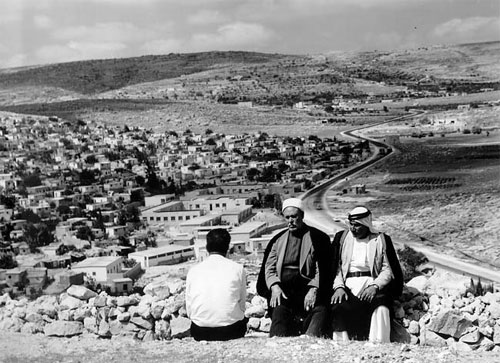
 |
| Dheisheh camp. Photo: palestineremebered.com |
| Hassan Abdel Jawad, Dheisheh camp, June 4:
|
|
It is Mona Hamza Muhaisen who introduces me to Hassan Abdel Jawad, a friend and neighbour in Dheisheh camp. Muna was to become renowned as the founder of the 'Across Borders' internet project linking children in refugee camps, and as author of an excellent book about Dheisheh camp under the Second Intifada, as well as many articles about camp life and people. At the time of this recording she was living in the camp with her husband Ahmad.
Hassan was said to be one of the most imprisoned men in the West Bank. He had been deported to Jordan and imprisoned there too. He had even been imprisoned after the Oslo Accords, in a period supposed to be the beginning of the 'solution' of the Palestinian conflict. This had been the hardest of his prison experiences because the international support that had built up for Palestinians during the 'first' Intifada was undermined by Oslo. He spoke of the harsh effects for his wife and children of his continuous absence in prison, how they lived waiting for him to come home, only to have him re-arrested soon after. The small formal reception room crowded with arm chairs but empty of children or domestic clutter emphasizes how space in camp homes must be multi-functional, with the furnishing of community activism, a small business, or social visiting layered onto general living space. In most of my recordings with women, the room is full of children, relatives or neighbours. I miss them here but recognize their absence as a sign of Hassan's status. Another clear sign of his community activism is that he speaks much about the general situation and history of the refugees, so that his own personal story appears as merely an illustration of this broader collective picture. He is a 'public' man, and as such has suffered an extraordinary deformation of his life. But they too - his wife and four children - have suffered from his absence, maybe more deeply. He speaks about this: the thought of their suffering seems to have left more lasting effects on him than the torture he was subjected to in prison. |
His wife, though without qualifications, was forced to work. He feels his children's futures have been jeopardized by the absence of father and guide.
After he stops speaking about his own life, he asks me to re-start the recorder so that he can talk about his parents. His mother had heart trouble and died rather young, cut down by having three of her sons deported. Any evocation of maternal suffering always opens my tear ducts. Tears trickle down my face, and I have to blow my nose. Hassan chides me. This is all part of the struggle, he says. But I wonder how people who have gone through so much suffering feel when the struggle seems to be over (as it did briefly for some Palestinians after the Oslo Accords), and 'normality' reasserts itself in the form of competition, individual ambition and desires.
Hassan Abdel Jawad speaks: |
["Suhayla"] [Hajji Fatima Da`jen] Copyright©2005 |
|